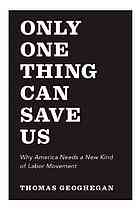
Only One Thing Can Save Us
Why America Needs a New Kind of Labor Movement
کتاب های مرتبط
- اطلاعات
- نقد و بررسی
- دیدگاه کاربران
نقد و بررسی

October 27, 2014
This unsettling cri de coeur from a veteran labor lawyer laments the extent to which unions have vanished from the American workforce and political consciousness. Geohegan, who explored modern Germany’s social democracy in Were You Born on the Wrong Continent?, spotlights that country’s principle of “co-determination,” in which blue-collar workers share power with executives, as an alternative to the U.S. economy’s low-skill, low-wage blueprint. But his prescriptions for finding our way back to a union-backed middle class are tough to see as feasible: bolstering unions to raise wages, and backing away from four-year college education as a panacea in lieu of more high-skills vocational education and mentorship opportunities. Similarly, creating a constitutional right to union membership sounds good, but Geohegan’s own experience makes it clear how much of an uphill fight such an amendment would require. Even for those who agree on the need to create a new labor movement in principle, his closing exhortation that “unless we do so, you and I are done” will seem less inspiring than intended.

October 15, 2014
A union lawyer offers radical prescriptions to resuscitate a moribund labor movement.In a book that suggests that a revival of labor is necessary to the survival of democracy, Geoghegan (Were You Born on the Wrong Continent?: How the European Model Can Help You Get a Life, 2010, etc.) admits from the outset that prospects look grim in a country that seems to regard Big Labor as an anachronism. But with the "drop-by-drop disappearance of the middle class," with wages slashed and job security replaced by contract work, desperate times require desperate measures: "Some say that our current income inequality is no longer like the Roaring Twenties or even the Gilded Age: we're reaching inequality that we haven't known since feudalism. Charlemagne, not J.P. Morgan, is the relevant comparison." The author suggests moving the battle lines from union-corporation (where the latter has won) to the political arena, where the Democratic Party has failed to represent the interests of its longtime constituents, and to the government, where the Civil Rights Act should be extended to encompass union busting. He finds hope in service professions such as nursing and teaching, where battles are fought over conditions that can benefit the community at large (greater resources, smaller class size) beyond narrower concerns such as salary and security, and where public opinion is the ultimate arbiter. Some of Geoghegan's suggestions might seem counterintuitive: that globalization can save American labor rather than simply deport jobs, that unions would be better off representing those who join enthusiastically rather than representing all, and that the Democratic Party's emphasis on education is misplaced (resulting in greater student debt rather than necessarily higher salaries). However, he insists that since the stakes are so high, a new labor resurgence cannot succeed with the old game plan. A manifesto that provokes even when it doesn't convince and tempers its broadsides with humor and a conversational style.
COPYRIGHT(2014) Kirkus Reviews, ALL RIGHTS RESERVED.

























دیدگاه کاربران